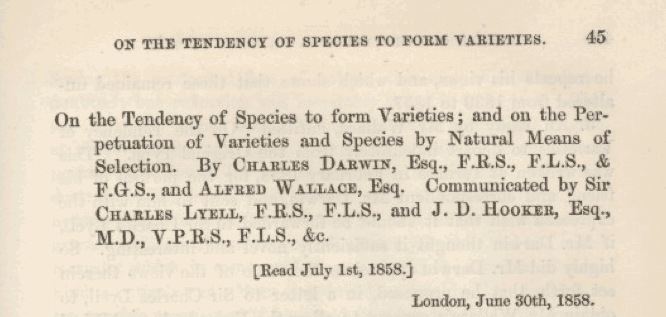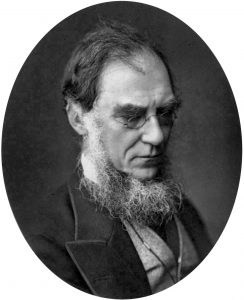Darwin and Wallace papers
23 Extract from an unpublished manuscript on species by Charles Darwin
TITLE
On the Tendency of Species to form Varieties; and on the Perpetuation of Varieties and Species by Natural Means of Selection.
By CHARLES DARWIN, Esq., F.R.S., F.L.S., & F.G.S., and ALFRED WALLACE, Esq. Communicated by Sir CHARLES LYELL, F.R.S., F.L.S., and J. D. HOOKER, Esq., M.D., V.P.R.S., F.L.S, &c.
[Read July 1st, 1858.]
London, June 30th, 1858.

Preface
MY DEAR SIR,—The accompanying papers, which we have the honour of communicating to the Linnean Society, and which all relate to the same subject, viz. the Laws which affect the Production of Varieties, Races, and Species, contain the results of the investigations of two indefatigable naturalists, Mr. Charles Darwin and Mr. Alfred Wallace.
These gentlemen having, independently and unknown to one another, conceived the same very ingenious theory to account for the appearance and perpetuation of varieties and of specific forms on our planet, may both fairly claim the merit of being original thinkers in this important line of inquiry; but neither of them having published his views, though Mr. Darwin has for many years past been repeatedly urged by us to do so, and both authors having now unreservedly placed their papers in our hands, we think it would best promote the interests of science that a selection from them should be laid before the Linnean Society.
Taken in the order of their dates, they consist of:—
1. Extracts from a MS. work on Species*, by Mr. Darwin, which was sketched in 1839, and copied in 1844, when the copy was read by Dr. Hooker, and its contents afterwards communicated to Sir Charles Lyell. The first Part is devoted to “The Variation of Organic Beings under Domestication and in their Natural State;” and the second chapter of that Part, from which we propose to read to the Society the extracts referred to, is headed, “On the Variation of Organic Beings in a state of Nature; on the Natural Means of Selection; on the Comparison of Domestic Races and true Species.”
* This MS. work was never intended for publication, and therefore was not written with care.—C. D. 1858.
2. An abstract of a private letter addressed to Professor Asa Gray, of Boston, U.S., in October 1857, by Mr. Darwin, in which he repeats his views, and which shows that these remained unaltered from 1839 to 1857.
3. An Essay by Mr. Wallace, entitled “On the Tendency of Varieties to depart indefinitely from the Original Type.”This was written at Ternate in February 1858, for the perusal of his friend and correspondent Mr. Darwin, and sent to him with the expressed wish that it should be forwarded to Sir Charles Lyell, if Mr. Darwin thought it sufficiently novel and interesting. So highly did Mr. Darwin appreciate the value of the views therein set forth, that he proposed, in a letter to Sir Charles Lyell, to obtain Mr. Wallace’s consent to allow the Essay to be published as soon as possible. Of this step we highly approved, provided Mr. Darwin did not withhold from the public, as he was strongly inclined to do (in favour of Mr. Wallace), the memoir which he had himself written on the same subject, and which, as before stated, one of us had perused in 1844, and the contents of which we had both of us been privy to for many years. On representing this to Mr. Darwin, he gave us permission to make what use we thought proper of his memoir, &c.; and in adopting our present course, of presenting it to the Linnean Society, we have explained to him that we are not solely considering the relative claims to priority of himself and his friend, but the interests of science generally; for we feel it to be desirable that views founded on a wide deduction from facts, and matured by years of reflection, should constitute at once a goal from which others may start, and that, while the scientific world is waiting for the appearance of Mr. Darwin’s complete work, some of the leading results of his labours, as well as those of his able correspondent, should together be laid before the public.
We have the honour to be yours very obediently,
CHARLES LYELL.
JOS. D. HOOKER.
J. J. Bennett, Esq.,
Secretary of the Linnean Society.

“But let the external conditions of a country alter. If in a small degree, the relative proportions of the inhabitants will in most cases simply be slightly changed; but let the number of inhabitants be small, as on an island, and free access to it from other countries be circumscribed, and let the change of conditions continue progressing (forming new stations), in such a case the original inhabitants must cease to be as perfectly adapted to the changed conditions as they were originally.”
“Now, can it be doubted, from the struggle each individual has to obtain subsistence, that any minute variation in structure, habits, or instincts, adapting that individual better to the new conditions, would tell upon its vigour and health? In the struggle it would have a better chance of surviving; and those of its offspring which inherited the variation, be it ever so slight, would also have a better chance. Yearly more are bred than can survive; the smallest grain in the balance, in the long run, must tell on which death shall fall, and which shall survive. Let this work of selection on the one hand, and death on the other, go on for a thousand generations, who will pretend to affirm that it would produce no effect .. ?”
“To give an imaginary example from changes in progress on an island:—let the organisation of a canine animal which preyed chiefly on rabbits, but sometimes on hares, become slightly plastic; let these same changes cause the number of rabbits very slowly to decrease, and the number of hares to increase; the effect of this would be that the fox or dog would be driven to try to catch more hares: his organisation, however, being slightly plastic, those individuals with the lightest forms, longest limbs, and best eyesight, let the difference be ever so small, would be slightly favoured, and would tend to live longer, and to survive during that time of the year when food was scarcest; they would also rear more young, which would tend to inherit these slight peculiarities. The less fleet ones would be rigidly destroyed.”
“Besides this natural means of selection, … there is a second agency at work in most unisexual animals, tending to produce the same effect, namely, the struggle of the males for the females. These struggles are generally decided by the law of battle, but in the case of birds, apparently, by the charms of their song, by their beauty or their power of courtship, as in the dancing rock-thrush of Guiana. The most vigorous and healthy males, implying perfect adaptation, must generally gain the victory in their contests. This kind of selection, however, is less rigorous than the other … “

Reflection
How does Darwin explain how changes in external conditions (or the environment) can lead to changes in the organisms living there?
Media Attributions
- Dr. Joseph Hooker © Unknown, via Wikimedia Commons is licensed under a Public Domain license

